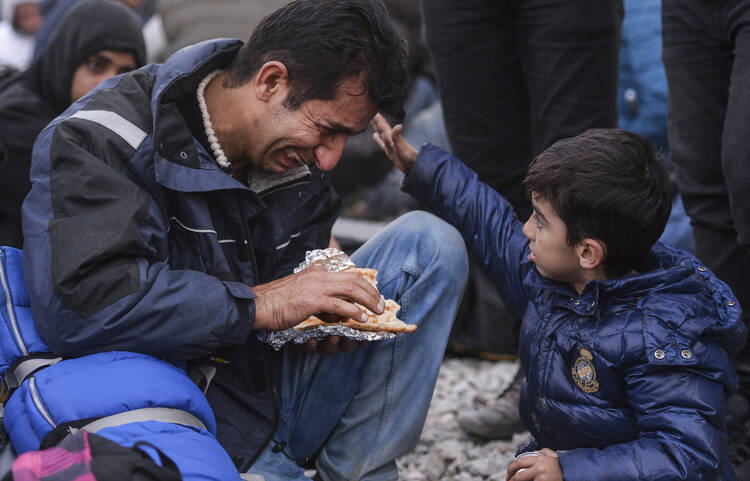In the aftermath of the Nov. 13 terror attacks in Paris, a level of anxiety is understandable, said Bill Canny, executive director of the USCCB's Office of Migration and Refugee Services. But governors and other politicians are not responding reasonably by calling for a “pause,” even the termination of efforts to resettle Syrian refugees in the United States. Refugees being selected for U.S. resettlement, he said, “are certainly not a credible threat by any way, shape, or means.”
“The people who are fleeing ISIS are fleeing for the same reasons that anyone flees,” he said. “They're being bombed. They're not being allowed to express their freedom of religion. There are Christians and other minorities involved.” As a free, open society, it is not in America’s interest, he said, “to shut the doors to folks who are fleeing persecution.”
Beyond the fact of their legitimate asylum claims, he adds, that people coming into the United States through the refugee resettlement program are the most vetted migrants now entering the country. “They go through an extensive security check,” Canny said, that can take anywhere between 18 to 24 months. “We know where they're going in the United States. Oftentimes they're going to join families, distant relatives that they have, but also through agencies when they get here like our [M.R.S.] and Catholic Charities.”
He said the U.S. bishops and Catholic Charities USA has extensive experience in refugee resettlement dating back decades. “We help them integrate into society, so it's a much different operation than what we [are seeing] for example in Europe, where people show up at the shores or at the borders.”
The lengthy vetting process begins in refugee camps in the Middle East and Europe where many have been "languishing for years." Many of those accepted for resettlement already have family connections in the United States, according to Canny, and many of the people accepted by America asylum authorities come from among the most vulnerable of refugee populations, “the elderly and the sick, often unaccompanied children.”
He adds that while the conference is happy to entertain suggestions for improvements, U.S. bishops are confident that the current “extensive” security protocol for evaluating resettlement applicants is more than adequate to guard against infiltration by ISIS or other terrorist elements.
That confidence apparently is not shared in powerful quarters around the country.
Republicans in the House of Representatives on Nov. 19 won a veto-proof majority, 289-137, on a bill blocking Syrian and Iraqi refugees from entering the U.S. (The bill's status in the Senate was uncertain, however.) And governors in at least 30 states have called for an end to Syrian resettlement until security concerns can be addressed.
In Louisiana state police patrolled outside diocesan offices after a caller threatened people in the the resettlement program of Catholic Charities of the Diocese of Baton Rouge. The threat came as Catholic Charities staffers handled calls from people concerned that the agency was resettling Syrians, said Carol Spruell, Catholic Charities communications coordinator.
That kind of fear can’t be justified according to the nation’s actual experience with refugee resettlement. Canny was unable to recall in decades of these efforts a single instance of an asylum seeker striking out in a terrorist act within the United States.
Indeed the State Department reports that of the 785,000 refugees resettled since 9/11, only 12 have ever faced terror-related charges and none of those charges reflected acts of domestic terror.
The fearful turnabout of public opinion on Syrian refugees, perhaps inspired by the response of many U.S. politicians and from among some candidates in the 2016 presidential race, has been disheartening in light of the positive response the U.S. Catholic community had been showing.
“After Syrians and other refugees…began to boat and walk to Europe, and actually to die along the way,” said Canny, “we had an excellent and loving response from the Catholic Community.”
Parishes, Catholic groups, congregations, dioceses were calling in to find out how they could help, he said. In response “we're actually involved in expanding our resettlement network to meet the needs and also the hopes and desires of our Catholic community and others around the country to be more helpful and to welcome these people who have suffered for so much, for the last five years.”
“You have children who haven't been able to go to
school,” Canny said. “You have people who now have been able to get proper medical care. You have people who want to work who haven't been able to find work in the countries where they currently are.”
He adds, “We want to show them solidarity and we want to show them love, as of course Pope Francis told us to do during his recent trip to the United States.” Canny points out that a good percentage of the Syrians seeking a refuge in the United States are Christians who had been facing a kind of genocide at the hands of ISIS. That does not mean the the bishops conference at all intends to join some voices who have suggested that Syrian Christians only should be offered refuge in the United States. Ninety percent of ISIS victims are fellow Muslims, he said. “Again, these people are fleeing terrorism. They're fleeing oppression.” They want to get away from the war, he said, away from ISIS, to come to America like generations of people before them “to establish new lives.”








